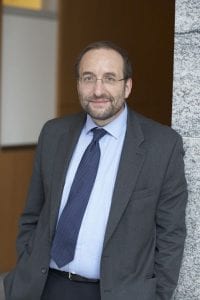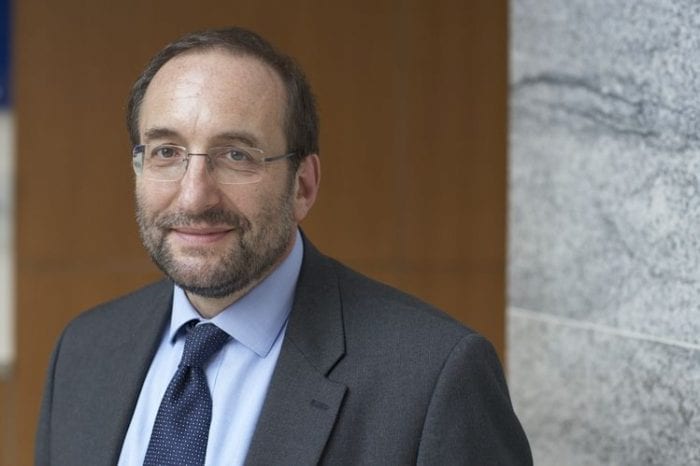By Daniel Dunaief
Dr. Paolo Boffetta, who joined Stony Brook University as Associate Director for Population Sciences in the Cancer Center in the midst of the pandemic last April, asks the kinds of questions doctors, scientists and non-scientists also raise when they look at illnesses among groups of people.
An epidemiologist who worked for 20 years at the World Health Organization and at Mt. Sinai Hospital in New York City for 10 years, Boffetta joined Stony Brook because he saw an opportunity to replicate the kind of success he and others had at Mt. Sinai, where he helped the institution earn a National Cancer Institute designation. Cancer centers can apply for NCI designation when they have a well-established portfolio of research.

“The idea to try to get the Cancer Center” at Stony Brook “to the NCI level was very appealing,” Boffetta said. Stony Brook was looking to build out its population sciences work.
In addition to the big picture goal of helping Cancer Center Director Yusuf Hannun and other researchers earn that designation, Boffetta has partnered with several scientists at Stony Brook and elsewhere to address questions related to various illnesses.
Boffetta has applied for $12 million in funds over six years from the National Cancer Institute for a new water project.
The research will recruit people who are over 50 years old across several towns, primarily in Suffolk County to explore the link between the potential exposure these residents had to different chemicals in drinking water and types of cancers.
“The main idea is that people may be exposed to carcinogens through drinking water according to where they have been living,” Boffetta said.
The scientists will follow these residents over time to determine the health impact of their town of residency. “If this is funded, this will be a major project that will involve many institutions,” he added.
The chemicals they will study include nitrates, chlorinated solvents, 1,4-dioxane, and perfluoroalkyl substances.
While he awaits word on potential funding for the water effort, Boffetta and others are looking at another project to explore the link between various environmental factors and bladder cancer. This is not limited to drinking water contamination. The group plans to analyze tumor samples to see whether they can detect fingerprint mutations.
World Trade Center Studies
Boffetta also plans to continue and expand on work he’s done at Mt. Sinai with responders of the World Trade Center attacks, a group that has received considerable attention from numerous scientists at Stony Brook.
He has been “doing a number of quite detailed analyses on cancer, including survival of workers and responders to developing cancer,” he said. The WTC survivors are enrolled in a medical monitoring treatment program, sponsored by the Centers for Disease Control, which means they “should be getting good cancer care.”
Boffetta has been comparing their survival to the population at large in New York, analyzing how the risk of cancer evolved over the almost 20 years since the attacks.
Boffetta has started to look at one particular new project, in which he studies the prevalence of clonal hematopoiesis of indeterminate potential (or CHIP), which is an asymptomatic condition that increases the likelihood of leukemia and cardiovascular disease. He is studying 350 healthy World Trade Center responders and a group of historical controls from the literature.
He plans to use the results of his study to develop strategies to prevent these diseases in WTC responders.
In some of his WTC studies, Boffetta is working with Ben Luft, Director of the Stony Brook WTC Wellness Program at the Renaissance School of Medicine at SBU, who has been involved in providing extensive research and clinical support for WTC responders.
Boffetta is an “internationally renowned cancer epidemiologist” who contributed his “vast experience on the impact of environmental and occupational exposures [that were] seminal in our understanding of how the disaster of 9/11 would eventually lead to increased numbers of cancer cases among responders,” Luft wrote in an email.
Boffetta’s contribution and understanding will “transcend the events of 9/11 and its impact on the responder community to a general understanding of the increased incidence of cancer on Long Island,” said Luft.
While Boffetta has several academic affiliations with institutions including Harvard University, where he teaches a class for a week each year, and Vanderbilt University, his primary focus involves the work he conducts at Stony Brook and at the University of Bologna.
Boffetta plans to keep his research team considerably smaller than the 80 to 100 people who worked with him at the World Health Organization. Indeed, he said he mainly focuses on working with collaborators. He plans to hire his first post doctoral researchers soon.
As for teaching, Boffetta has been working with the program directors of the Masters of Public Health to develop a tract in epidemiology. He plans to start teaching next year.
Boffetta, who spoke with Times Beacon Record News Media through WhatsApp from Italy, said he often works double shifts to remain in contact with his colleagues in the United States and Europe. When he’s in the United States, meetings can start at 6 in the morning to connect with his European counterparts in the middle of their day. When he’s in Italy, his last meetings sometimes end at 11 p.m. or midnight.
Boffetta, however, said he has “a normal life,” which, prior to the pandemic, included trips to the opera and museums. He also enjoys skiing and hiking.
Married to Antonella Greco, who used to teach Italian, Boffetta lives in New York City. He has three daughters, who live in Brooklyn, Italy and Uruguay. He has been vaccinated against COVID-19 and is looking forward to the opportunity to interact with his colleagues in person once restrictions caused by the pandemic ease.





